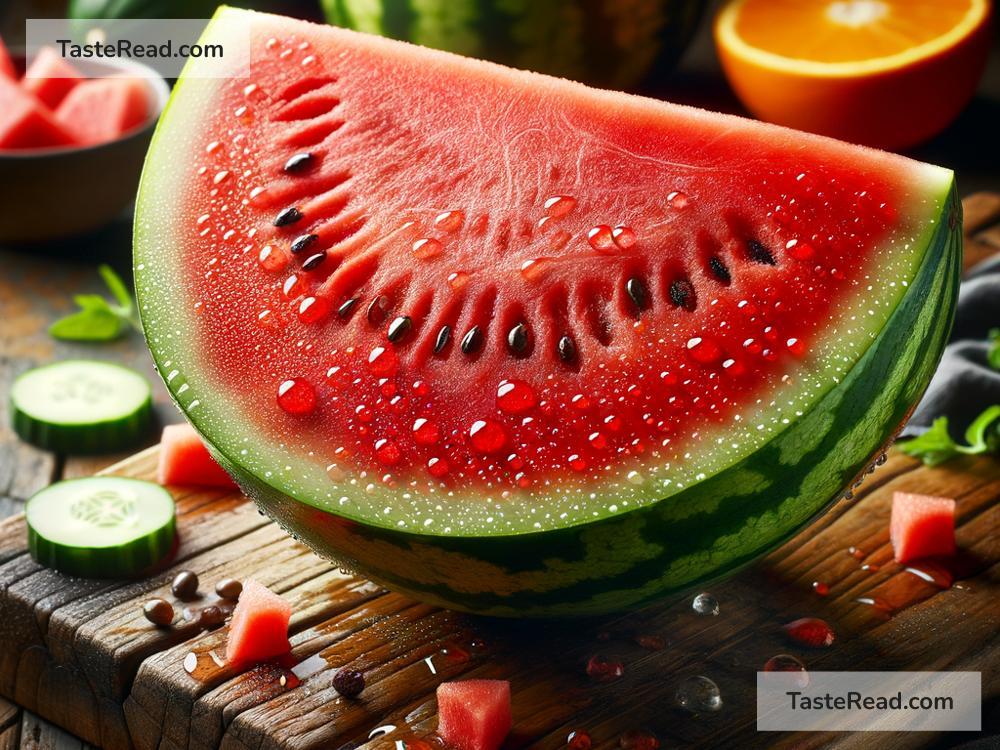Why Fruits with High Water Content Taste Juicy
Have you ever bitten into a watermelon or a strawberry and thought, “Wow, this tastes so juicy!”? The juiciness of fruits is one of the best things about eating them, especially on a hot day when you need something fresh and hydrating. But have you ever wondered why some fruits feel so juicy in your mouth? The answer lies in their water content, and today we’ll explore why fruits with high water content taste so juicy.
What Makes Fruits Juicy?
Fruits are nature’s candy, packed with natural sweetness and flavors. But they aren’t just tasty—they’re also full of water! In fact, some fruits, like watermelon, cucumber, and oranges, can be made up of 90% or more water.
This high water content is what gives fruits their juicy texture. When you bite into a fruit like a peach or a grape, the water stored inside its cells is released. It floods your mouth with an explosion of fresh, sweet liquid. This is why fruits with more water feel juicier than fruits with lower water content, like bananas or dates.
Why Does Water Content Matter?
Water content doesn’t just make fruits juicy—it also serves other purposes. Fruits need water for growth and survival. The water helps transport nutrients throughout the fruit as it develops. As a result, fruits contain natural sugars and nutrients dissolved in water, creating the delicious flavor we enjoy.
When a fruit is full of water, it’s like nature’s version of a drink inside a snack. Biting into a high-water-content fruit satisfies both your thirst and hunger because the water keeps you hydrated. Fruits with less water, like nuts or dried berries, are still tasty, but they don’t give you that refreshing feeling because there’s not much liquid for your taste buds to pick up.
What Happens When You Bite Into a Juicy Fruit?
The moment you bite into a juicy fruit, several things happen. First, the pressure you apply to the fruit’s skin causes its cells to break open. Inside those cells are tiny pockets of water mixed with sugars, vitamins, and natural flavor compounds. When the cell walls break, the liquid spills out, filling your mouth with delicious juice.
This burst of liquid catches your taste buds by surprise! You immediately taste the sweetness of the fruit’s natural sugars and feel the refreshing coolness of the water. It’s the perfect combination for enjoyment and hydration.
Which Fruits Are the Juiciest?
Not all fruits are created equal when it comes to juiciness. Fruits with the highest water content tend to taste the juiciest. Here are some examples of juicy fruits:
-
Watermelon: Watermelon is the king of hydrating fruits, made up of about 92% water. It’s perfect for hot summer days because it quenches your thirst while treating your taste buds to sweetness.
-
Oranges: Oranges and other citrus fruits like lemons and grapefruits are bursting with juice. That’s one reason orange juice is such a popular drink.
-
Strawberries: Strawberries aren’t just delicious—they’re also packed with water. Their firm but juicy texture makes them perfect for snacking or adding to desserts.
-
Cucumbers: Although technically a vegetable, cucumber is often grouped with fruits due to its high water content. It’s a great example of how food with lots of water feels juicy.
-
Grapes: Each little grape is like a tiny water balloon! Grapes are sweet, hydrating, and satisfying to eat.
If you’ve ever eaten dried versions of these fruits, like raisins (dried grapes) or dried strawberries, you’ll notice they’re not nearly as juicy. That’s because the drying process removes the water, leaving you with the concentrated sugars and flavors but no liquid burst.
Why Juiciness Makes Fruits Taste Better
Juiciness isn’t just about hydration—it also impacts how fruits taste. The flavors you experience when eating fruits come from compounds dissolved in water. Natural sugars, vitamins, and acids blend together in the water inside the fruit to create unique flavors. Without the water, the flavor wouldn’t be as well-rounded or intense.
Juicy fruits are also satisfying to eat because the juice fills your mouth. The liquid spreads over your taste buds evenly, letting you enjoy every part of the fruit’s flavor. That’s why biting into a juicy mango feels so indulgent—the experience is sensory overload, in the best way!
Conclusion: Juicy Fruits Are a Gift from Nature
Fruits with high water content are a gift from nature that nourishes, hydrates, and delights us. Their juiciness isn’t just about tasting good—it’s also about staying hydrated and enjoying wholesome food. Watermelon, oranges, strawberries, and many other fruits are not only sweet and refreshing but also packed with nutrients your body needs.
Next time you bite into a juicy fruit, take a moment to appreciate how its high water content contributes to the flavor, texture, and overall experience. Whether you’re snacking on grapes or sipping orange juice, juicy fruits are a simple pleasure that brighten our days.

